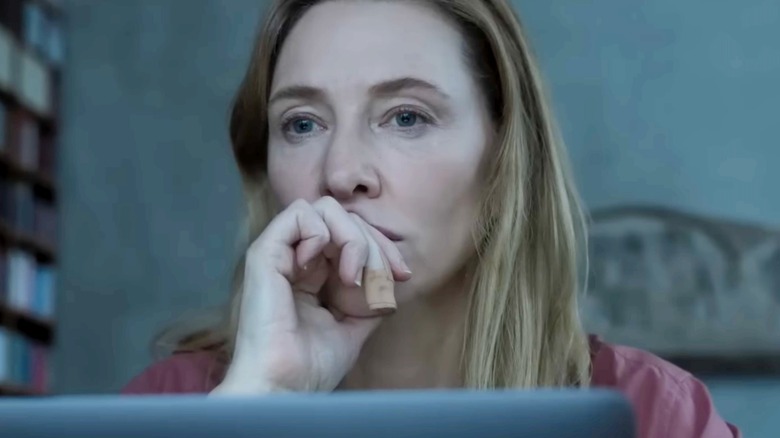
For cinephiles, every Cate Blanchett film is a major event simply because of her participation, but "TÁR" represents the turning of a new page for the actress. The film is both aware of and informed by Blanchett's stature and prowess. It's the most overt sign to date that her commanding screen presence is too big to deny. Her brilliance is now just a commonly held truth.
At this point, declaring that Cate Blanchett is the best actress of her generation should hardly qualify as a controversial statement. She's Gen X's answer to Meryl Streep, both in the consistent quality of her work and her undeniable commitment to the craft of acting. While we've come to expect certain elements from a Blanchett performance — resolute strength, undeniable intelligence, and a flair for the theatrical — each is its own distinct and special experience. And with her interest in producing only just beginning to result in exciting new projects from emerging voices making their way to the screen, Blanchett's cinematic legacy looks like it will extend far beyond her existing filmography.
In celebration of Blanchett's latest career-defining turn, we're taking a look back at 18 of her most notable cinematic achievements. These films cut across nearly a quarter-century and showcase the wide range of the actress' talents and tastes. From epic adventures like "The Lord of the Rings" to quiet dramas like "Carol," from studio comedies like "Ocean's 8" to poetic odysseys like "Knight of Cups," Blanchett's career showcases her deep passion and understanding of the medium across genres and styles. The proof of her brilliance is evident in her varied, versatile output.
Eyes Wide Shut (1999)
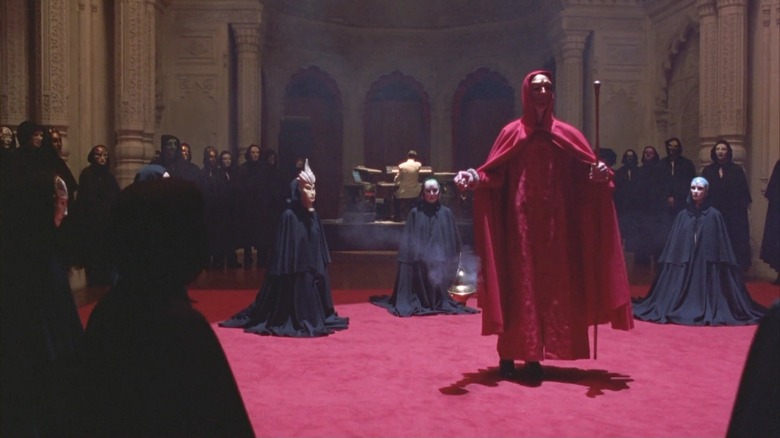
Even for its fans, Stanley Kubrick's final film, "Eyes Wide Shut," has always been something of a mystery wrapped inside an enigma. This cryptic drama about a New York couple slowly coming undone by their jealousy and suspicions is an object of dark fascination and, given that Kubrick died shortly before the film's release, perhaps compulsory reverence. As cinephiles have sat with "Eyes Wide Shut" over time and begun to parse its inscrutability, the film's reputation has only grown (IndieWire recently named it the best movie of the 1990s)
But even as more of the film has revealed itself with the passage of time, certain mysteries have persisted — especially those around the eyebrow-raising masked orgy scenes. At the center of this evening of high-class debauchery is a shrouded figure credited as "Mysterious Woman." She catches the eye of Tom Cruise's Dr. William Harford, a wayward husband who crashes the bacchanalia out of curiosity and covetousness. Actress Abigail Good cuts an imposing physical presence in the frame opposite Cruise, but for two decades, no one knew who provided the character's ominous voice.
For the film's 20th anniversary, an oral history in Vulture finally revealed the vocal artist behind Mysterious Woman: none other than Cate Blanchett. "We wanted something warm and sensual," said the late Kubrick whisperer Leon Vitali, "but that at the same time could be a part of a ritual." In retrospect, it's a bit wild that it took people two decades to figure out Blanchett's participation. Even with just her voice, she provides a complex portrayal of a contradictory character whose chilly charm cannot help but entice anyone around her to try and learn more.
Babel (2006)
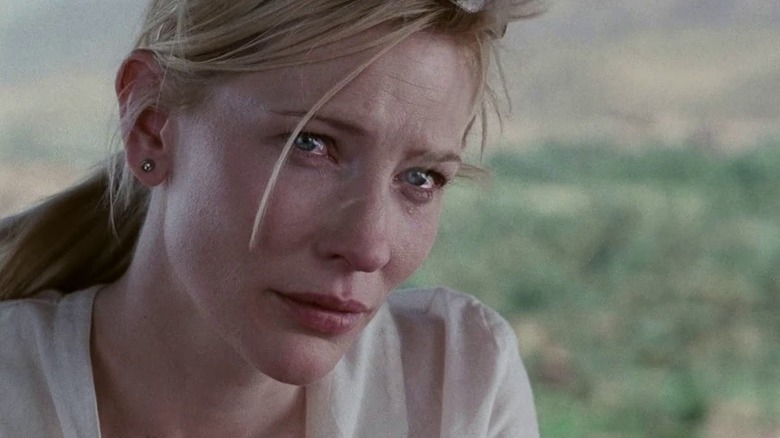
Once upon a time, the internet was not just a hellscape of social isolation and ideological polarization, but a genuine source of hope and connection. The so-called cinematic phenomenon of "hyperlink cinema," which swept prestige filmmaking in the early 2000s, reflected the hope of a world where geographic barriers disappeared and unexpected ties between people emerged. This narrative style received its biggest canvas with Alejandro G. Iñárritu's "Babel," a multinational thriller that charts the ripple effects of a single bullet in a post-9/11 world. The common thread tying all the disparate storylines together? That would be Cate Blanchett's Susan.
Blanchett's actual screen time in "Babel" is quite small, limited to only a few scenes in which she's an active participant. But in those moments, she's present in her emotional absence on vacation with husband Richard (Brad Pitt) in Morocco. In mere minutes, Blanchett establishes the enormity of the rift that's opened up in Susan's marriage while also conveying her disappointment in the disappearance of their love. It's even more impressive that she manages to do this with such scant and vague dialogue.
Both elements are crucial, given that Susan takes an unexpected bullet through the window of their tour bus, which comes from a gun wielded by two local children who received the weapon as an afterthought from their goat-herding father. That a plot of international intrigue opens up from the threat to Susan's fragile life speaks to just how effectively Blanchett convinces us that her onscreen husband cares enough to shake geopolitical cages in the name of her safety.
Ocean's 8 (2018)
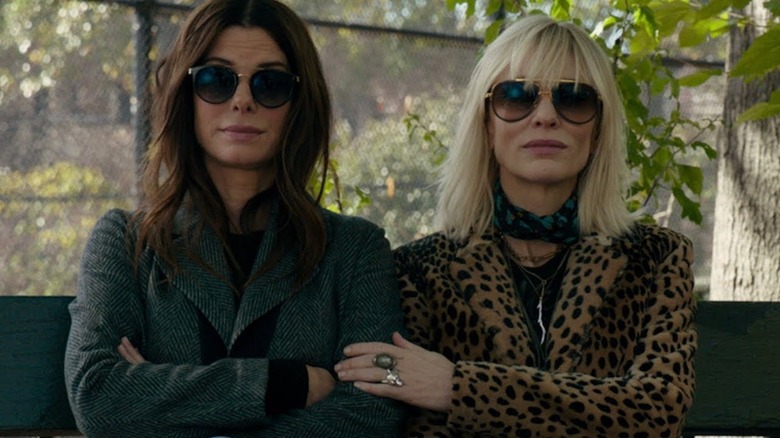
It's only in the past few years that Cate Blanchett has really let herself kick back and do pure popcorn fare — even her earlier blockbusters, like "The Lord of the Rings," had real artistic heft. These days, she's not above participating in the Marvel Cinematic Universe, giving a fun turn as villain Hela in Taika Waititi's "Thor: Ragnarok." But among her crowd-pleasing projects, she pops the most as a colorful member of the girl gang heist team in the breezy "Ocean's 8."
Blanchett's Lou Miller is the right-hand woman to Sandra Bullock's Debbie Ocean, the sister of George Clooney's Danny from the Soderbergh trilogy. Lou is impossibly stylish (that hair! those sunglasses!) as well as incredibly savvy, bridging the gap between strategic planning and streetwise smarts that makes her the unsung MVP in any crew. Blanchett is an able ensemble player amidst a grand cast in "Ocean's 8," and it's to her great credit that her presence never pulls focus from the elaborate jewelry heist at the center of the film. She's always adding more to any scene than she takes from it, even if that means slipping into the background.
Is this a revolutionary, groundbreaking performance from Blanchett? No, of course not. But it's not meant to be, and she deserves to have some fun. Many high-minded actors off-road into studio filmmaking to take a breather from heavy material. The key difference between Blanchett in "Ocean's 8" and the lazier version of this career move is that she lets us in on the fun she's having.
Knight Of Cups (2016)
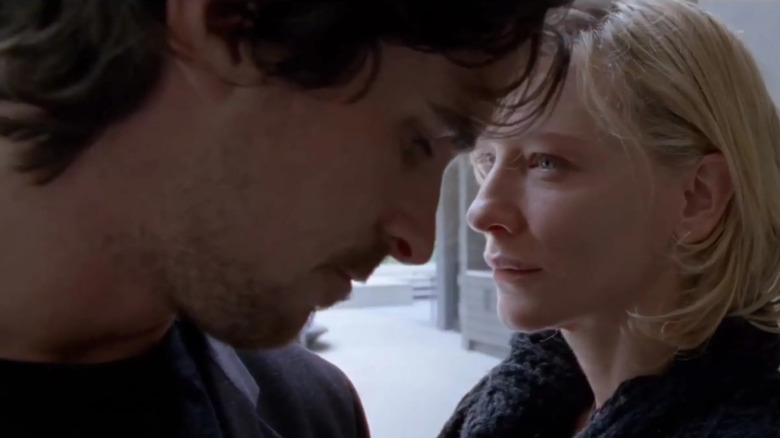
Cinematic poet Terrence Malick has a notorious way of working with actors, shooting vast amounts of footage and then slicing it to pieces during editing. Some actors get cut out altogether or, worse, end up like Adrien Brody, who arrived at the premiere of "The Thin Red Line" assuming that he was the star of the film, only to find his role reduced to nothing. Classically trained actors obsess over their characters' continuity, tracing cause and effect across a linear arc. Malick takes that tool away, or at least makes it unreadable to the audience.
It takes a special performer to thrive in this unconventional environment, so it should come as no surprise that Cate Blanchett has logged multiple collaborations with Malick. She can rise to the occasion, communicating the meaning of a moment in just a stolen glance, or by positioning her body relative to the camera or a character. As such, Blanchett perfectly fits in the ethereal, transitory "Knight of Cups" as Nancy, the ex-wife of protagonist Rick (Christian Bale). The film's title and its structure derive from tarot cards; Nancy's section is simply "Judgment," and she provides a tough reckoning for Hollywood lothario Rick on his fumbling journey of self-discovery. Blanchett can play both a person and an idea at the same time, collapsing allegory and metaphor into one grounded character. It's clear that she let herself become clay for Malick to mold, abandoning any preciousness about her process and giving herself over to the director's vision of the film.
Truth (2015)
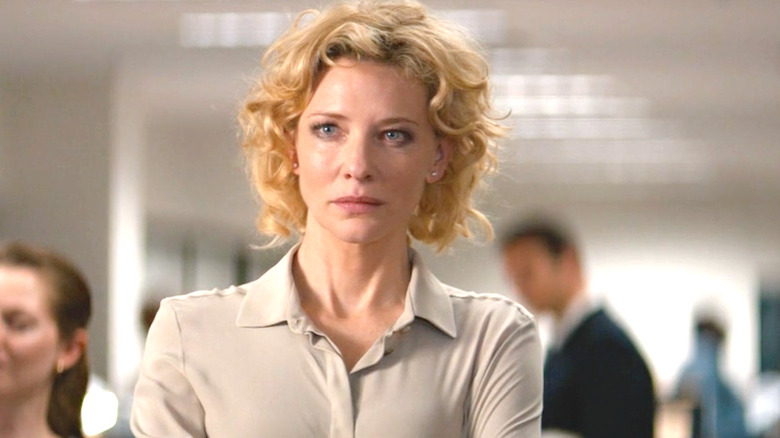
Cate Blanchett occasionally runs into a problem where she delivers too many good performances in a calendar year. Occasionally, awards campaigns can accommodate both in separate categories; she's one of just a dozen actors to ever receive dual Oscar nominations for acting in the same year. However, in 2015 she headlined two films gunning for year-end attention, and one emerged as the clear favorite. The other release that year was "Truth," which was clearly beneath its competition ... and also not worth writing off as a failure.
Even though Blanchett plays the protagonist of "Truth," she's not necessarily the film's main attraction. That would be the legendary Robert Redford, delivering one of his final performances as "CBS Evening News" anchor Dan Rather, a titanic figure in his own right. The film traces the fallout of a 2004 segment in which Rather presented reporting that questioned George W. Bush's military service just as the president geared up for re-election. Bush's allies work the refs, trying to discredit the sourcing and evidence to avoid facing the substance of the claim.
In the fallout, Rather chooses to retire, but he's at the tail end of a storied career anyways. Blanchett's Mary Mapes, the telecast's producer, ends up taking much of the real damage. "Truth," which premiered during the infancy of the Trump phenomenon, now assumes the tenor of a prescient warning from a not-too-distant past. The fourth estate cannot tell truth to power when those in power ignore facts and reality. This rage and fearfulness find an effective vessel in Blanchett, whose performance channels a searingly righteous anger.
Cinderella (2015)
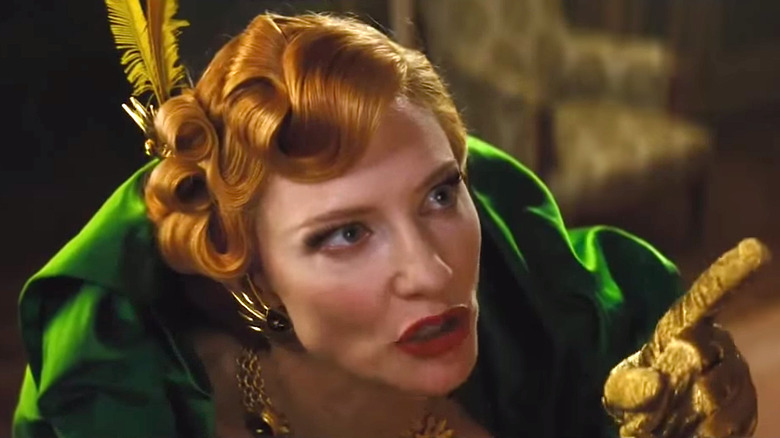
Sure, Kenneth Branagh's live-action remake of "Cinderella" was a canary in the coal mine for the direction that Disney's reimaginings of its animated classics would go. Gone was the model that the Mouse House tested out on Tim Burton's "Alice in Wonderland," which allowed for a little bit of directorial flair. In its place was an almost direct transposition of the animated film that went heavy on fan service, delighting lovers of the original by simply recreating it. If you grew up on the 1950 "Cinderella," this version will probably effectively manipulate your feelings of nostalgia, thereby disguising its status as a carbon copy.
But for those who want — or need — something a little more from "Cinderella," at least Cate Blanchett is in the cast. As Cinderella's wicked stepmother, she brings all the pomp and theatricality to a character who more or less embodies evil itself. But there's more to Blanchett's performance than high camp. She stakes out a middle ground between the flatness of an animated caricature and the dimensionality of a real human, creating an indelible character whose terror cannot be easily dismissed. There's something downright Machiavellian to Blanchett's version of the stepmother, a strategic brilliance that only reads because the actress lets us know that the character has a real mind at work behind those cutting glances. Further, "Cinderella" shows her not just as a necessary impediment to Cinderella's redemption arc, but as a person in her own right, one who has the ability to beguile even good-hearted people. She's all the more frightening for it.
The Lord Of The Rings: The Fellowship Of The Ring (2001)
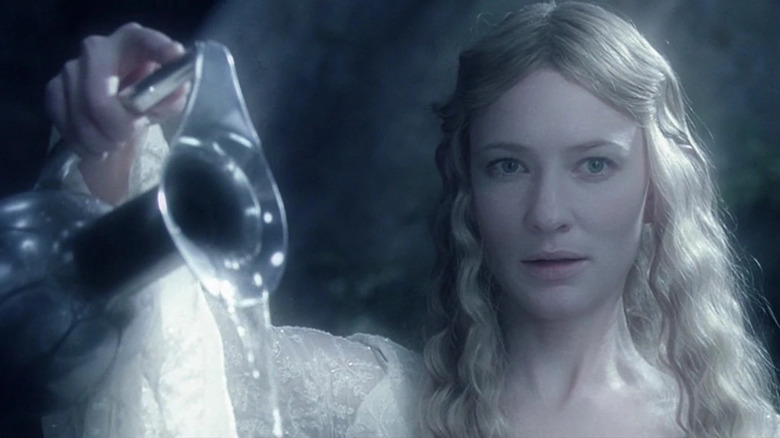
Cate Blanchett's quiet centrality to the success of "The Lord of the Rings" franchise is such that Peter Jackson had to figure out a way to shoehorn Galadriel into "The Hobbit" trilogy despite the character not being in that part of Tolkien's writing. But her performance holds both the promise and peril of the hero's journey, and thus she had to be there. What's remarkable is how her presence in any of these movies, even "The Fellowship of the Ring," always seems far greater than her screen time. Heck, she's only in one scene in "The Two Towers."
In "The Fellowship of the Ring," Blanchett's Galadriel appears toward the end of the proceedings, although she does narrate the film's opening montage, lending the expositional dialogue both grace and firmness. She greets the Fellowship with seemingly welcome arms, but later gives Frodo a frightening glimpse of what his future could be before fighting her own desire to take the ring for herself. She says little, but Jackson's camera frequently manages to capture what hides underneath Galadriel's gentle glances — a terrifyingly powerful and coldly calculating character. In her best work, Blanchett crafts exquisite tension between what she shows and how her character feels, and "The Lord of the Rings" makes that explicit: Galadriel's tranquil surface belies a more sinister self-interest. It's a living testament to the maxim that there are no small parts, only small actors, and no one could ever accuse Blanchett of being the latter.
The Talented Mr. Ripley (1999)
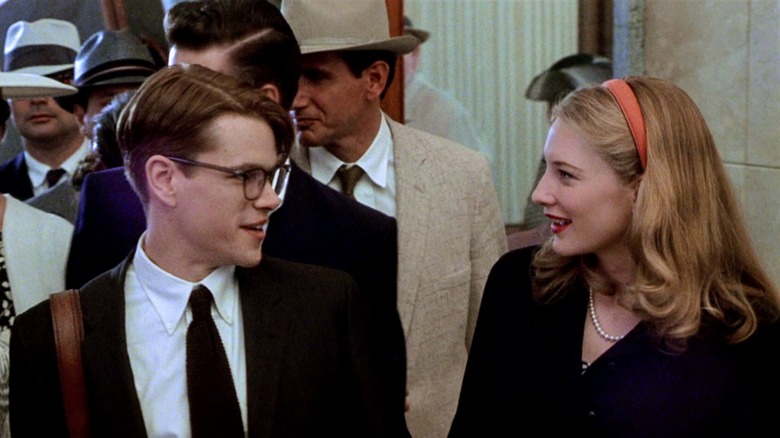
It's incredibly rare to see Blanchett playing someone who isn't the smartest or most powerful person in the room. So, it's quite the performance that she gives in "The Talented Mr. Ripley" as the guileless Meredith Logue, a mid-century American socialite who crosses the path of Matt Damon's conniving and craven Tom Ripley. When she meets him, she's unaware that he's just a working-class striver. With no reason to believe otherwise, she takes the charming fellow at his word and accepts that he's actually Dickie Greenleaf, the wealthy playboy who Ripley must pick up and repatriate back to America.
In Blanchett's hands, Meredith provides a calming presence as the Italian-set intrigue takes a deadly turn. She stands in for the disbelief of the audience, hoping for the best in all circumstances. Her gentility and graciousness make her a compelling counterweight to Ripley, who digs in deeper to his depravity with each passing scene.
Meredith's willingness to suspend disbelief to accommodate Ripley's contortions of the truth is sometimes implausible, but any faults in the character feel like they come from the script rather than Blanchett's performance. She's able to locate that part inside all of us that desperately wants to believe that people are inherently good and trustworthy, even going so far as to discredit all the obvious warning signs. She's also not shy about occasionally playing up Meredith's privilege, which allows her to put up tremendous blinders to the malice lurking around her.
Elizabeth (1998)
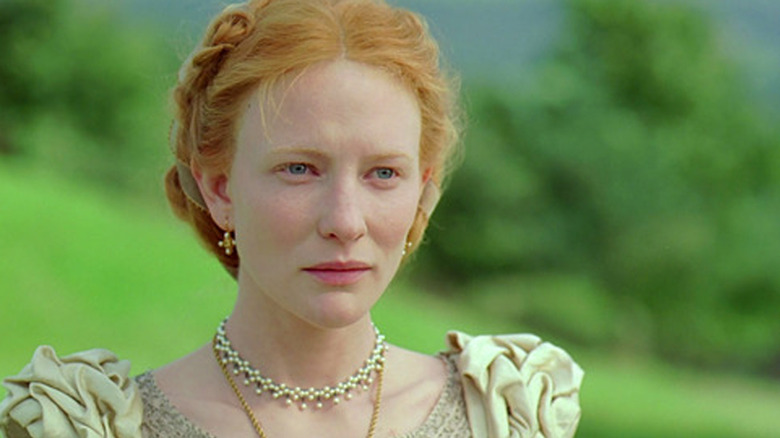
Cate Blanchett's breakout role in 1998's "Elizabeth" also functions like something of a superhero origin story for the actress. A young Blanchett plays Queen Elizabeth I at the beginning of her reign, a time of religious and political turmoil in England when Catholics and Protestants battled for the soul of the nation. After some civil strife with her half-sister, Mary I, she must consolidate power and unite her people. But assuming political power and wielding it are two entirely different things, something Elizabeth must learn for herself as she decides the kind of ruler she wishes to be.
Blanchett would revisit the role nearly a decade later in 2007's "Elizabeth: The Golden Age," once again to Oscar-nominated effect. Yet to simply watch her be Elizabeth does not hold the same fascination as watching her become Elizabeth. Most of Blanchett's roles assume a kind of power and prowess because she effortlessly exudes a sense of authority. "Elizabeth" shows how that disposition is a developed trait, not an inherent quality. Elizabeth starts the film as strong but a bit sheepish. She's easily thrown off course when challenged, especially when the basis for a confrontation has its roots in gender.
Shekhar Kapur's film is at its best when it lets the audience peer in on the mythmaking behind Elizabeth I's public persona. As this film tells it, the image of the Virgin Queen derives largely from her desire to work around the men who court and doubt her in equal measure. Neither Blanchett nor the film superimpose a contemporary feminism onto Elizabeth, though her quest for independence and self-sufficiency as a sovereign does echo powerfully.
Manifesto (2017)
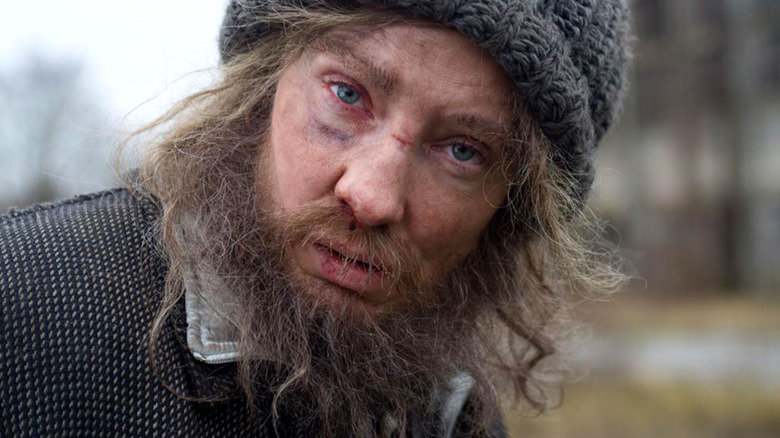
On paper, the idea of someone incanting various artistic and political manifestos at you in direct address sounds more like punishment than pleasure. But when it's Cate Blanchett doing that recitation, the equation changes. In Julian Rosefeldt's "Manifesto" the actress embodies 13 different personas, each of whom pulls quotes from influential manifesto texts that range from Karl Marx to Jim Jarmusch. It's a testament to Blanchett's tremendous versatility that she can assume so many different guises and make each of them as persuasive as they need to be.
"Manifesto" is instructional, but it never feels like a lecture. Though the project was initially envisioned and staged as a gallery installation where each of Blanchett's personas appeared on a screen and reverberated off each other in a large room, it still works as a compartmentalized feature. In one segment, she's a homeless man screeching the tenets of Situationism. In the next, she's a broker praising Futurist ideology. Blanchett also takes on the personas of a schoolteacher, a news reader, a scientist, a garbage worker, a puppeteer, a choreographer, a funeral speaker, and a tattooed punker.
It's the full range from one of our most gifted performers, capturing the essence of archetype so purely that she never gets in the way of the real focus of the project: the words themselves. Through Blanchett's delivery, dry texts come to life before our eyes and break out from the constraints of theory. It's proof that Cate Blanchett does not just make art. She is art.
Nightmare Alley (2021)
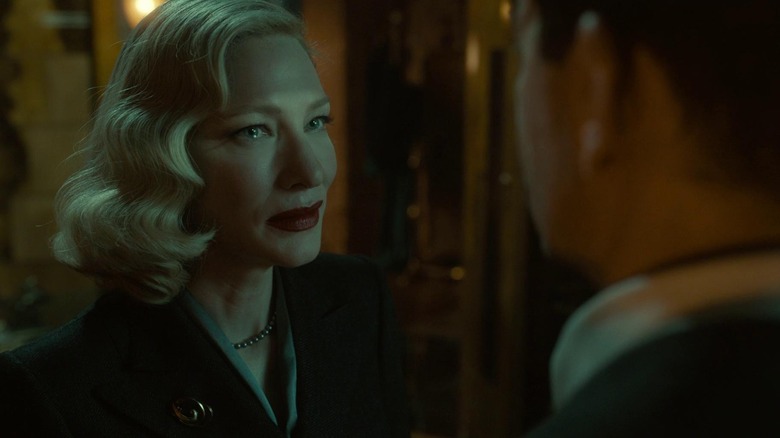
Haters will say it's just a reheat of campy "Carol," but Blanchett is doing some astonishing period work in "Nightmare Alley." It's the kind of performance she could probably do in her sleep at this point, but this is anything but phoned in. Blanchett's take on the classical femme fatale oozes with an authentically sultry sensuality that suits the film noir-era setting. You could place her opposite a Lauren Bacall or a Barbara Stanwyck, and she'd fit right in. Blanchett is every bit as valuable to establishing the period atmosphere as any technical element of Guillermo del Toro's craftsmanship.
Her performance is not just an imitation or incarnation of an idea, either. As Dr. Lilith Ritter, a cunning psychologist, she puts the "arch" in "archetype." Blanchett really gets del Toro's "Nightmare Alley" remake revving when she enters in the film's second half. Her character provides the perfect foil for Bradley Cooper's tortured illusionist, Stanton Carlisle, who perfects his act in a Depression-era circus circuit. She spots both his strength as well as his insecurity in the art of deception, attempting to lure him into a trap of her own with her seductive wiles. In the disguise of a mutually beneficial partnership, she attempts to extract value from someone who she sizes up as a gullible mark. The mental game of cat-and-mouse that plays out between Blanchett and a hungry Cooper is thrilling to watch unfold, even if you've seen the 1947 original and know the result of their tête-à-tête.
Notes On A Scandal (2006)
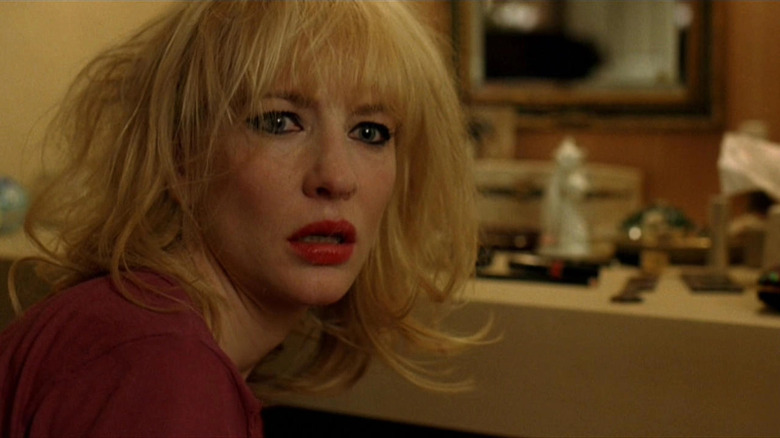
Jet fuel can't melt steel beams, but if there's metal furniture on set and Cate Blanchett cuts her teeth on a scene, she can chew right through it. In "Notes on a Scandal," Blanchett goes for broke as Sheba Hart, a woman whose self-destructive choices push her to a breaking point. She goes maximalist on the maximalism, which is ... a lot. It's also the perfect choice for the film. Blanchett's delectable deviance is totally in keeping with the sensationalist storytelling of the film itself.
Sheba makes one big mistake: releasing her stress and indulging her desires. She's constantly in service to others, be they the students she teaches at school or the special-needs son she cares for at home. She rationalizes that she deserves pleasure as a result, even if it comes from the troubled 15-year-old Steven Connolly. Things get even worse when she becomes enmeshed with crotchety, closeted lesbian Barbara (Judi Dench), who has a twisted agenda of her own. With each step, Sheba finds it harder to crawl out of the pit created by her own mistakes, and Barbara's apparent cover comes with self-serving strings attached.
When Blanchett finally screams Sheba's final line — "Here I am!" — in an act of surrender, it lands with the weight of a bomb. It's a bit overwrought for a domestic drama, sure, but Blanchett conveys the stakes as the character herself experiences them. She might be scenery-chewing in "Notes on a Scandal," but Blanchett is doing some masterful mastication.
I'm Not There (2007)
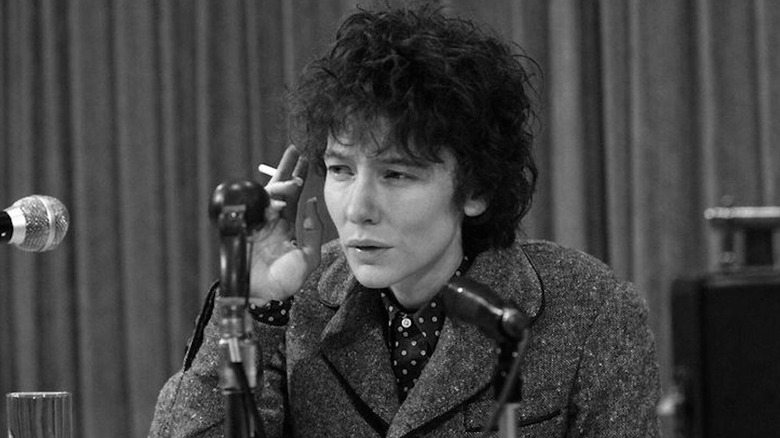
"Chameleonic" is not a word often used to describe Cate Blanchett. While not a hard and fast rule, she does bring a traditionally self-assured, strong persona to each part she plays, and her characters usually look a lot like the actress herself. All that fades away in "I'm Not There," in which Blanchett is one of many pieces of the puzzle that is Bob Dylan. A figure of such intrigue and iconic stature cannot be captured in a standard biopic, so filmmaker Todd Haynes splits the many faces of the musician into six different "characters" who represent one of Dylan's different sides.
Blanchett has the most deceptively simple of the six Dylans. Her "Jude Quinn" is the one who most literally resembles the man himself in both stature and standing. But she's not just doing imitation or caricature. Haynes tasks Blanchett with finding the mystery within the image that fans know so well. Her take on Dylan is present in the way that a cloud of smoke is: palpable, but impossible to capture with your fingers.
Blanchett also navigates the gender ambiguity of playing someone coded "male" in the popular imagination with a unique grace. It doesn't feel like she's a woman playing a man in a gimmicky way. Rather, it appears that Blanchett transcends gender altogether by capturing something larger-than-life in a person who was bigger than such a simple construct to begin with. In a film full of fascinating refractions, Blanchett best captures the project's mission by tapping into something unknown – or perhaps entirely unknowable – within a figure who we think we know everything about.
The Aviator (2004)
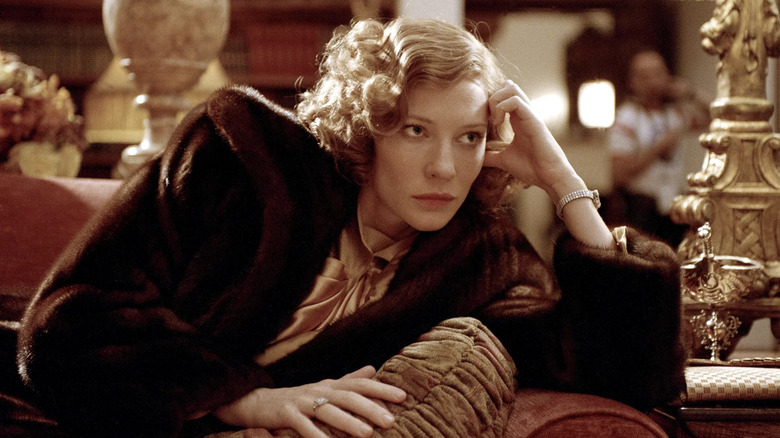
Cate Blanchett won her first Academy Award for playing the actress who has won more of those trophies than any other performer in history: the inimitable Katharine Hepburn. Daring to play such a legend of the silver screen is a commendable challenge, and Blanchett succeeds with flying colors as she captures Hepburn's fizzy, intoxicating charm. As with any performance where the actress portrays a familiar figure, Blanchett's turn in "The Aviator" captures both the image and imagination of the individual without falling back into easy imitation. Her take on Hepburn is studied enough to approximate the actress' presence, but not so academic that it feels robotic. To put it succinctly, she never loses sight of the "person" within the "persona."
It certainly helps that Blanchett's version of Hepburn steals the spotlight whenever she's on screen, but is not the focus of the film. She dips in and out as a frequent flame of Martin Scorsese's subject, Howard Hughes (Leonardo DiCaprio). Such a position frees Blanchett from having to hit a lot of the boring biopic beats, enlivening the film with her punchy wit and sincere soulfulness. Her brief romantic dalliance with Hughes as the brash businessman forays into Hollywood encapsulates Hepburn's overall effect. The notoriously obsessive-compulsive Hughes sees his anxieties fade away as he spends more time with her, a micro-level representation of how Depression-era audiences saw Hepburn as an escape from the harsh realities of the time.
The Curious Case Of Benjamin Button (2008)
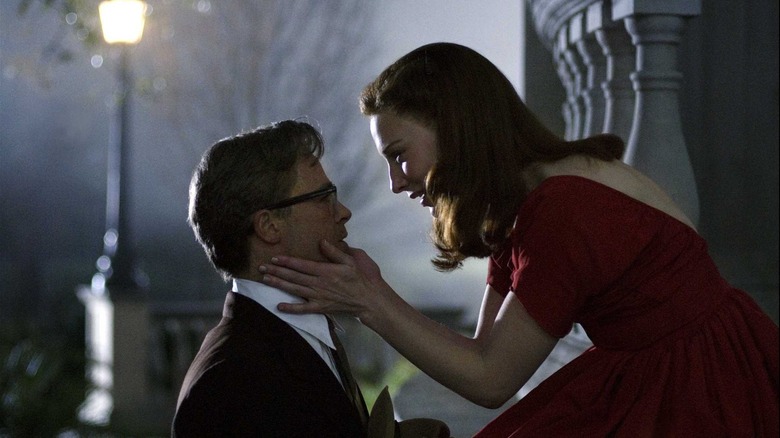
Blanchett usually plays steely, sturdy characters who rarely wear their feelings on their sleeves. That's not to say that she, or her characters, are unemotional. It's just that she rarely leads with vulnerability in her performances. That's why "The Curious Case of Benjamin Button" feels like somewhat of an anomaly in her filmography, and stands as one of her most underappreciated and misunderstood feats.
This odyssey across the American century tracks the titular character, played by Brad Pitt, whose biological clock runs in reverse. He starts life as a shriveled old man and ends it as a toddler. In contrast, the constant object of his affection, Blanchett's Daisy, lives according to time's conventional forward motion. She's a crucial anchor who helps us understand and empathize with Benjamin's journey, struggling to reconcile her passionate approach to life and love with his dispassionate remove. It's no wonder that her deathbed confession frames the story – we see the film through Benjamin's eyes, but feel it through Daisy's heart.
Benjamin has little idea of how to respond to the developments in his life given his singular vantage point, and it's Daisy who tries to help ground him in the meaning of a moment. While he's cautious and timid, she's upfront about her needs and desires. The result of such naked emotionality is exposure to all the swings of fortune that life has to offer, careening between swooning highs and devastating lows. It's an uncommonly earnest and open turn for Blanchett, one that suggests that she may still have untapped reservoirs of earnest sentiment left to unleash.
TÁR (2022)
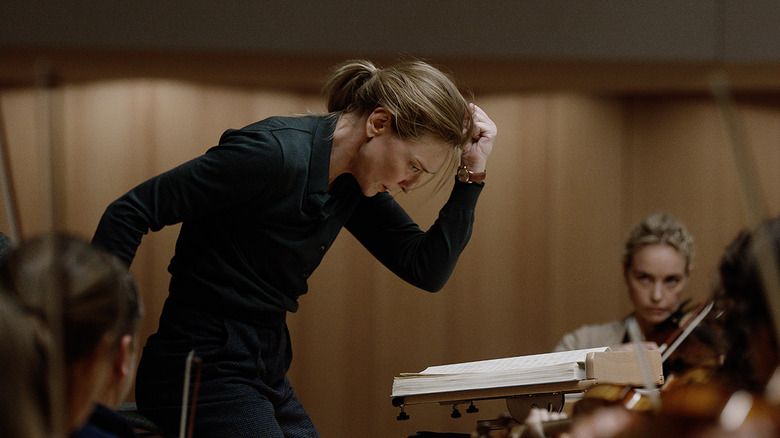
Todd Field's "TÁR" tells us that composer-conductor Lydia Tár is a genius by listing her numerous honors and achievements — She's an EGOT! She was mentored by Leonard Bernstein! — but all that's really necessary is holding the camera on Cate Blanchett's face. At the time of the film's release, her visage is so synonymous with artistic excellence that it does not take much of a lift to believe that she can embody someone at the top of their game.
Field said that he wouldn't have made "TÁR" had Blanchett turned him down, and it doesn't take long to understand why. There's no faking a character like this, one who has the relentless pursuit of artistic accomplishment and professional proficiency in their bones. It requires a meta-level transposition of performer onto character. The astonishing impact of Blanchett's cinematic creation confirms her cellular understanding of what it means to channel the sublime. The film assumes the tenor of a dissertation — or perhaps an apologia — on craftsmanship and commitment, as Tár's final push for a number of elusive career grails portends her undoing.
Her discontent with her current station, even as celebrated as she is, establishes Tár as the contemporary incarnation of a Greek tragic hero. Though she pugnaciously battles the swirling forces portending her demise, she cannot fight off the fate she tempts by acting as if she were invincible. "TÁR" leaves it up to the viewer to decide whether this cruel, confident, clever figure deserves what comes to her, but Blanchett never leaves the slightest bit of doubt about her character's complete conviction in her own correctness, and that spectacle proves irresistible to watch implode before our eyes.
Carol (2015)
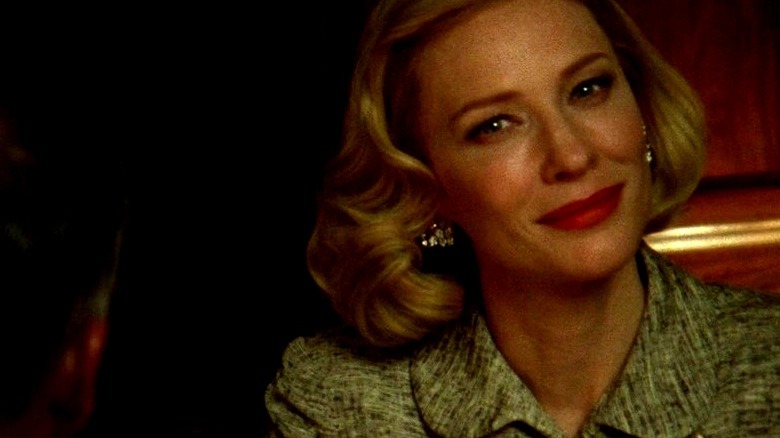
Blanchett's second team-up with "I'm Not There" director Todd Haynes resulted in what is perhaps her most technically accomplished turn to date. As the titular character in "Carol," a sincere recreation of mid-century melodrama, she's as precise as ever while giving a performance within a performance. Her Carol Aird is a '50s housewife and mother living in the suburban comforts of Connecticut, but she's role-playing her fondness for the comforts of American post-war prosperity. Carol harbors a secret desire for other women, which she cannot help but sublimate in symbolic exchanges with objects of her lustful gaze. The film follows the fallout from her unexpected meet-cute with Therese Belivet (Rooney Mara), a naïve department store clerk and aspiring photographer.
Given the extreme constraints of the setting, the two women cannot afford to openly express their love. Instead, affection is passed between Carol and Therese through coded language and pregnant pauses, as well as body language and stolen touches. "Carol" is a film of submerged passions so strong that they cannot help but bubble up to the surface, with calamitous ramifications.
In every bit of her performance, Blanchett ably conveys the vast chasm between what her characters does or says and how she actually feels. There's an irony necessary to Carol's existence that occasionally manifests as campiness, some of which does come through in Haynes' dollhouse-like environment. But as Carol strives to find the conditions where she can live according to the guidance of her heart, Blanchett's performance is overwhelming in its sincerity of spirit. The tragedy of "Carol" is not that these two women fell in love; it's that the world around them lacks any vision for what to do with that love.
Blue Jasmine (2013)
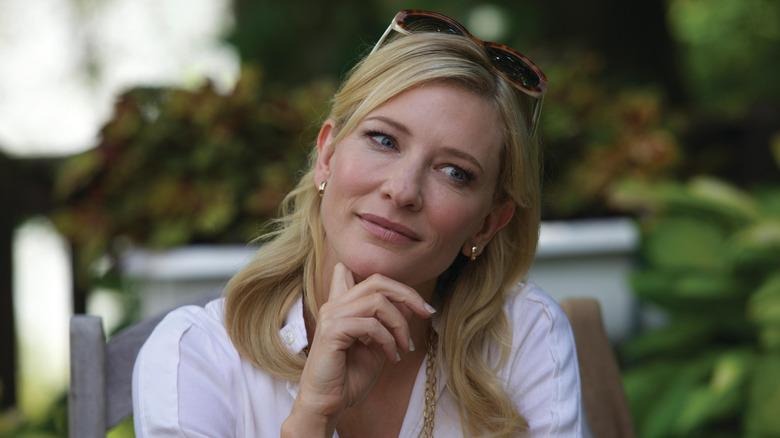
Picking the best Cate Blanchett performance is an impossible task, so perhaps it's best to let the top selection be the one in which she's firing across the most cylinders in a single package. "Blue Jasmine" is Blanchett in full bloom, martialing her most extravagant instincts as a performer into a portrayal of a woman who's never more than one missed antidepressant away from a total collapse. The titular Jasmine is a character of her own making, as the working-class Jeannette foreswears her working-class origins by changing her name and marrying into the Manhattan socialite class. After the downfall of her former husband, a thinly veiled analogue of Bernie Madoff, she's forced to confront the end of the fiction by moving in with her sister Ginger (Sally Hawkins) and her abrasive lover, Chili (Bobby Cannavale).
This high-wire act of a performance captures Blanchett's heightened unreality and theatricality as she does a modern take on Blanche DuBois from "A Streetcar Named Desire." When grandeur dissolves into delusion, can Jasmine simply live inside the illusion and ignore the tense family drama around her? Jasmine teeters precariously on the edge of a total nervous breakdown as she tries to bend reality to her will. However, Blanchett never lets Jasmine disappear so far into the mirage that she loses her tether to humanity.
The raw emotionality of Jasmine's retreat into fantasy is handled with compassion and conviction. Blanchett strips away all of her character's wealth and privilege until we're left with nothing more than a shaking, shattered shell of a woman. She begs for our compassion, or at least our pity. In spite of everything we've seen this character do, Blanchett makes it tempting to go against our better judgment and give it to her.
Read this next: The Best Movies Of 2022 So Far
The post The 18 Best Cate Blanchett Movies, Ranked appeared first on /Film.
0 Commentaires